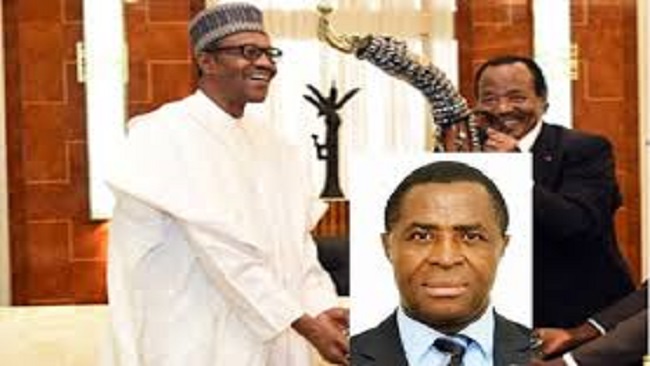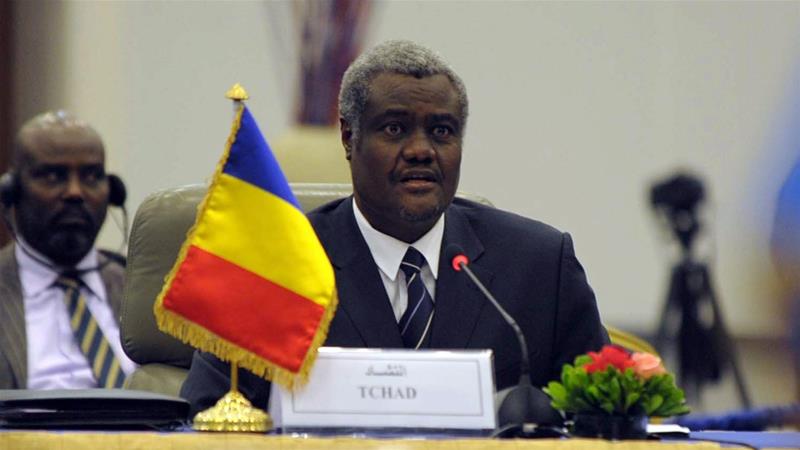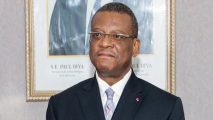17, September 2019
Why Buhari should intervene in ongoing genocide in Southern Cameroon 0
President Muhammadu Buhari and the Federal Government have been told not to stay aloof and watch the alleged ongoing genocide in the English speaking part of Cameron. Already about 35,000 people from Southern Cameroon are said to be taking refuge in Cross River State which shares boundary with Cameroon. This is as a Community leader from Southern Cameroun who lives in the United States, Edwin Ngang, said that the political elite from the Southern Cameroun have been cowed by the government of the country.
A group of people under the aegis of Nigerian Ambazonian Sovereignty Recognition Society, NASORES, explained that Cameron had been encroaching on the Nigerian territory in Boki axis of Cross River State after taking over Bakassi Peninsula. National Director of NOSORES, Hon. Cletus Obun said that timely intervention of President Buhari would be of tremendous relieve to Nigeria that is sorrounded by Franco-phone countries.
Obun, who was a former member of Cross River State House of Assembly representing Boki State Constituency said, “The targeted aim of shrinking the Nigerian territory is too painful and must not be allowed. “We will not stand aloof and watch people who are much in our image be maltreated, dehumnised and annihilated.” He called on the Federal Government “to campaign for the permanent solution to the problems of the indigenous minority English- speaking peoples of Cameroun by calling for an exclusive referendum on the choices of restoring their independence as Ambazonians or staying as Camerounians.
“To campaign for an “international peace-keeping force” to enforce NASORES’ call for an immediate cessation of hostilities between the Cameroun armed forces and the Amba fighters. “To plead that the Federal Government of Nigeria return to playing its natural role of peace making through conflict preemption and prevention not only in the Gulf of Guinea region; where its own immediate security is being threatened but in the rest of Africa by invoking the principle of territoriality. “To encourage Nigeria that now braced by this sacred jurisprudence of the principle of territoriality that is acknowledged Byau constitutive charter article 4(b), and by “the threat to peace” clause in United Nations charter article 51 and by its global commitment in the 2005 UN “responsibility to protect” (r2p), a unilateral intervention by the federal government will be the right thing to do since it will stop the ongoing war and its accompanying targeted genocide of the English-speaking peoples of Cameroun.”
He recalled with dismay the judgment that ceded Bakassi to Cameroon, adding,”we considered the known and surreptitious politics surrounding the so-called World Court judgment on Bakassi Peninsular and the consequent Green Tree Agreement. Neither Nigeria nor the people of Ambazonia find solace in this.” Continuing, he said, “I am sure that you are aware of the socio-political and economic storm raging over Southern Cameroun. Peaceful demonstrations demanding for a free and independent State have been met by repressive reprisals.
“Now, the government of President Paul Biya in Northern Cameroun has, in the bid to asphyxiate the bourgeoning demand for the Republic of Ambazonia, a part successor to the “Federal United Cameroon Republics, resorted to mass arrest, annihilation of perceived champions of the struggle, pogroms in small enclaves, graduated to full scale genocide since 2017 against the patient, oppressed and deprived people of Ambazonia. “To the uninformed, this blood-strewn canvass for sovereignty appears distant, faint and inconsequential. But to any Nigerian patriot and for anyone with inbuilt sensors to see beyond today, the conflict in South Cameroun should naturally grip attention, arrest focus and prick conscience. “It is even more pragmatic for Nigeria and Nigerians to look not only with a sense of human sympathy at the trails of the Ambazonian people but must search again with filial-feeling drawing on the sense of nostalgia, as to how things were, before we arrived at the current separateness occasioned by pencils drawn over cardboard sheets by the colonial authorities and the regrettable misfortune that was the February 11, 1961 so-called referendum.
“The time has come to call on the international community to discard the blanket of silence woven over Southern Cameroun while the region is on a wild loop of fire. It is time to speak up and let the various treaties, convention and accords binding on the member-countries of the United Nations begin to take their cause. “And we count that Nigerian authorities take this great and honourable leap not just as the giant of Africa but a direct beneficiary of a peaceful and quickest resolution of the conflict.
“This could be seen in the refugee burden that Nigerian is bearing and the peace initiatives she will be forced into, if the Ambazonia war independence flies to heights unimagined. We recall what Nigeria lost in men and material to the conflicts in Liberia, Sierra Leone, Congo now in Burkina Faso, and elsewhere in the world “Historically, the people being beaten, maimed and killed by the government of Cameroun were once affiliates of Nigeria. These were citizens of the British-administered Cameroun. They had representatives at the Eastern Nigeria House of Assembly and parliamentarians from there were among the best you could anywhere in the world at that time.
“Through the manipulation of an uninformed elite and the lukewarm attitude of some Nigerian leaders at that time, this key territory was allowed to slip off the radar of Nigeria. By a small margin, the British-administered Cameroun voted to merge with other parts of Cameroun. “That political marriage has not worked. The north has been and continues to constitute a wobbling cog in the progressive ambition of Southern Cameroun. What the departure of British-administered simply meant that Nigeria was stripped of any neighbor with a cultural and linguistic similarity.
“You are aware that our nation is surrounded by Francophone nations, who sometimes even conspire against issues of security and trans-global diplomacy. While Ambazonia can no longer be a full part of Nigeria as it was in the past, the possibility having a closer ally in aspects of economy, diplomacy, cultural ties and reliable proximity to one looking after the other, is too titillating to be ignored. “Any effort in the direction goes to fulfill the dreams of nationalists like Chief Obafemi Awolowo who saw a possibility in Nigeria flaunting her strength across West Africa not only in the way she settles conflicts but also in extension of her economic and cultural propensities to her immediate neighbours. Let me say the formation of Nigerian- Ambazonian Sovereignty Recognition Society, is preceded by the creation of a similar organization through what has now been internationally dubbed the Calabar Declaration.
“The “Ambazonian Liberation Movement” (ALIM) of Nigeria is a brainchild of the indigenous people of Nigeria of the Bakassi extraction and who continue to draw sympathy from a large spectrum across the Nigerian society. It is needless to stress how, Nigerians who hassled, chassed and pushed out of the ancestral homes following the ill-fated judgment which ceded wholesome Nigerian territory to Cameroun. “Many of our kindred are in refugee camps, other are roofless, in squalor and with no sense of dignifying living because the government of Cameroun regards and treats them as adversaries or intruders. ” This is a major determinant in our decision to take up the gauntlet and plead with our countrymen and women to see the war in Southern Cameroun as ours to win through Diplomacy of Necessity while discarding the lies fueled through the tunnels of deceit, cover-up and crass intimidation.”
Also briefing Edwin Ngang said: ”It is terrible and so sad that these wounds have resurfaced, but I fear it was always going to be thus with the exclusion of the English-speaking minority from the affairs of state. ”The only practical solution, from a distance, is a political settlement with either a United Nations or African Union peace-keeping contingent being placed on the ground to enable an immediate cessation of violence, ensuring a humanitarian protective intervention and a cooling- off period to create the conditions to allow an equitable settlement to be hammered out. “Building on lessons learned, autonomy but not separation in a close-knit federation is the formula for lasting peace and should be embraced as a solution. ”We have to admit the real and/or perceived denial of justice to a people is what creates radicals from moderates. This is because is its denial HOPE at the same time bringing hopelessness- all of these the breeding ground of extremism. “Another instance of hesitation that ended up as denial of justice to Ambazonians in Viscount waverley’s floor speech is when he invoked the sanctity and primacy of the rule of the law.”
www.vanguardngr.com





























19, September 2019
As Ambazonia crisis continues, national dialogue will focus on ‘bilingualism, cultural diversity and social cohesion’ 0
Cameroon’s leader Paul Biya, in an infrequent outing on Tuesday, September 10, announced talks to put to rest the crisis rocking the country’s English-speaking northwest and southwest regions – an impasse elapsing for the fourth year.
The conflict broke out in late 2016 when English-speaking Cameroonians began to protest the ongoing marginalization from the Francophone majority, who say the French-speaking majority government has consistently oppressed their language, culture and economies.
The protest movement, led mostly by teachers and lawyers, evolved into a militant separatist movement calling for the secession of English-speaking Cameroon. The government clamped down on Anglophone separatists and the conflict led to close to 2,000 people killed and over 500,000 displaced, according to the United Nations.
President Biya, who has been in power for 37 years, said the discussion would pull together people from a vast array of the country and will be chaired by Anglophone Prime Minister Joseph Dion Ngute.
“The dialogue in question will mainly concern the situation in the northwest and southwest regions. The dialogue will, therefore, rally all the sons and daughters of our beloved and beautiful country, Cameroon, to reflect on values that are dear to us, namely: peace, security, national unity and progress,” President Biya said on public television CRTV.
Gina Sondo @GinaSondo
In view of the National Dialogue, #Cameroon’s PM Dion Ngute will meet the following…
However, there are concerns the dialogue may be limited and remote-controlled by the country’s leadership.
Agbor Nkongho, a human rights lawyer, who was part of the initial protests, wrote on Twitter on September 11, reacting to the President’s speech:
Agbor Nkongho@AgborNkonghoF
The call for an inclusive dialogue is very appreciated. I urge those who will be attending to call for the release of all those detained in connection with the crisis, the need for constitutional amendment and also to ensure that the form of the state is equally discussed.
The Anglophone crisis in context
After World War I, Britain and France shared control over Cameroon. France ruled French Cameroon and Britain administered a territory then-called British Southern Cameroons.
French Cameroon gained independence in 1961 as La Republique du Cameroun while British Southern Cameroons voted to join La Republique du Cameroun to form the Federal Republic of Cameroon, made up of two states: West Cameroon (English-speaking) and East Cameroon (French-speaking).
However, the first president of Cameroon, Ahmadou Ahidjo, who held power from 1960-1982, abolished the federal system in 1972. Today, there are 10 regions in the United Republic of Cameroon, made of 8 French regions and 2 English regions.
Anglophone Cameroonians have long lamented suppression from Francophone Cameroonians, who have dominated the country’s leadership since inception.
In 1991, efforts made to incise the abscess of the Anglophone problem with a similar call for dialogue fell flat. The All Anglophone Conference in 1993 and 1994 also made no impact:
Dibussi Tande@dibussi
When Anglophone members of the Committee on Constitutional Reform, set up by @PR_Paul_BIYA in 1993, proposed an alternative Federal Constitution, the President instead convened a “Grand Debat National” to water down & sidestep Anglo demands #AnglophoneCrisis #AmbazoniaConflict
Nonetheless, President Biya recently announced a national dialogue to take place at the end of September, and several groups have already submitted proposals on how to resolve the crisis.
In one of them, the opposition party, the Social Democratic Front, led by vice-president Joshua Osih called for a neutral personality to chair the talks. Several Anglophone separatists are calling for the release of their leaders from prison after receiving life sentences.
Doubt, hope, fear ahead of talks
Netizens took to Twitter to express hope as well as doubt about the impact of the national dialogue plan. Solomon Amabo called for the need for a third-party presence to ensure transparency and inclusivity:
Solomon Amabo@solomon_amabo
Dialogue:’Who will I dialogue with?asked Mr Biya?He turns around and calls for National Dialogue,to dialogue with who then?Dialogue with ready-made resolutions-One and indivisible Cameroon?Only negotiations with 3rd party presence(UN,USA,etc)can be binding.We are not in 1961!
Peter Tah also worries about inclusivity and wonders how peace is possible without a clear ceasefire:
Peter Tah@TFomonyuy · 20hReplying to @TFomonyuy
It’s increasing clear that the national dialogue will focus on issues like bilingualism, social cohesion, cultural diversity, return of refugees, reintegration of ex-combatants & rebuilding of affected areas in the Northwest & Southwest regions of #Cameroon. #AnglophoneCrisis
Peter Tah@TFomonyuy
Looking at how predialogue talks are unfolding, it’s evident that this will be far from being inclusive. The regime seems to be picking & choosing those who would attend. Plus if this is dialogue on a crisis involving two parties, how come one party gets to draw up the agenda?
However, Biya clarified on Monday, September 16, that the national dialogues will focus on “bilingualism, cultural diversity and social cohesion, the reconstruction and development of conflict-affected areas, the return of refugees and displaced persons, the education and judicial system, but also decentralization and local development,” according to Cameroon Online.
The United Nations says it has taken in the resolve by Cameroon’s leader Paul Biya to settle the armed conflict in the country’s English-speaking regions.
The UN urged inclusive talks to end the conflict that has persisted for nearly four years:
Still, the September talks are announced amidst ongoing violence and a new surge of refugees fleeing insecure situations — including lockdowns and school closures for the last three years — in the northwest and southwest regions.
Culled from The Global Voice